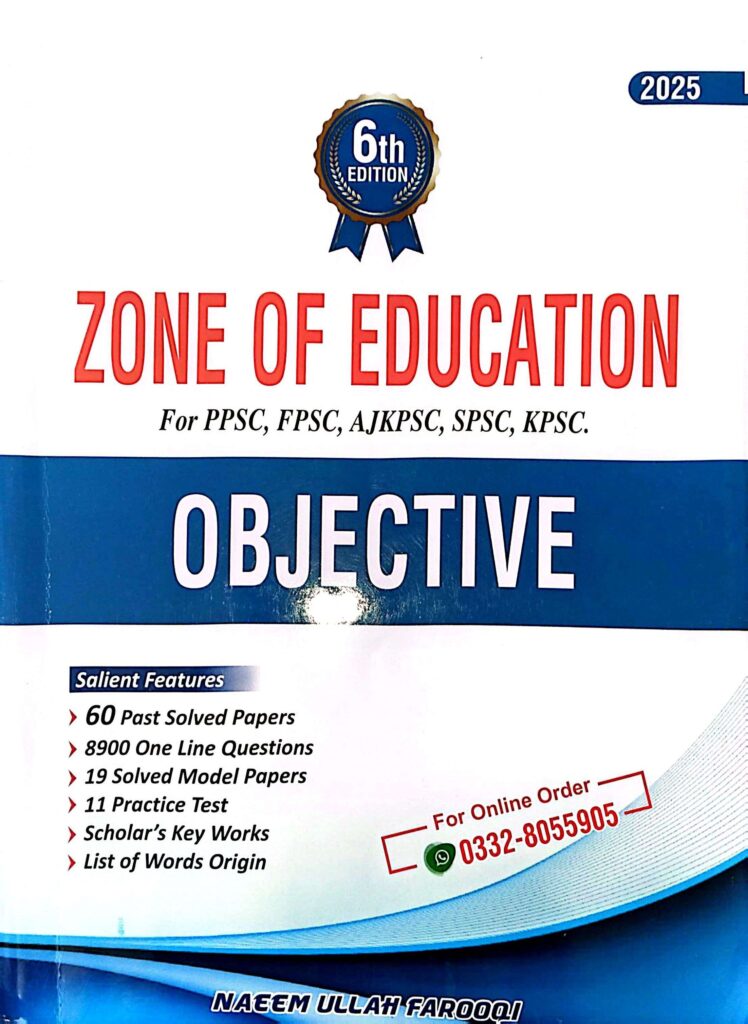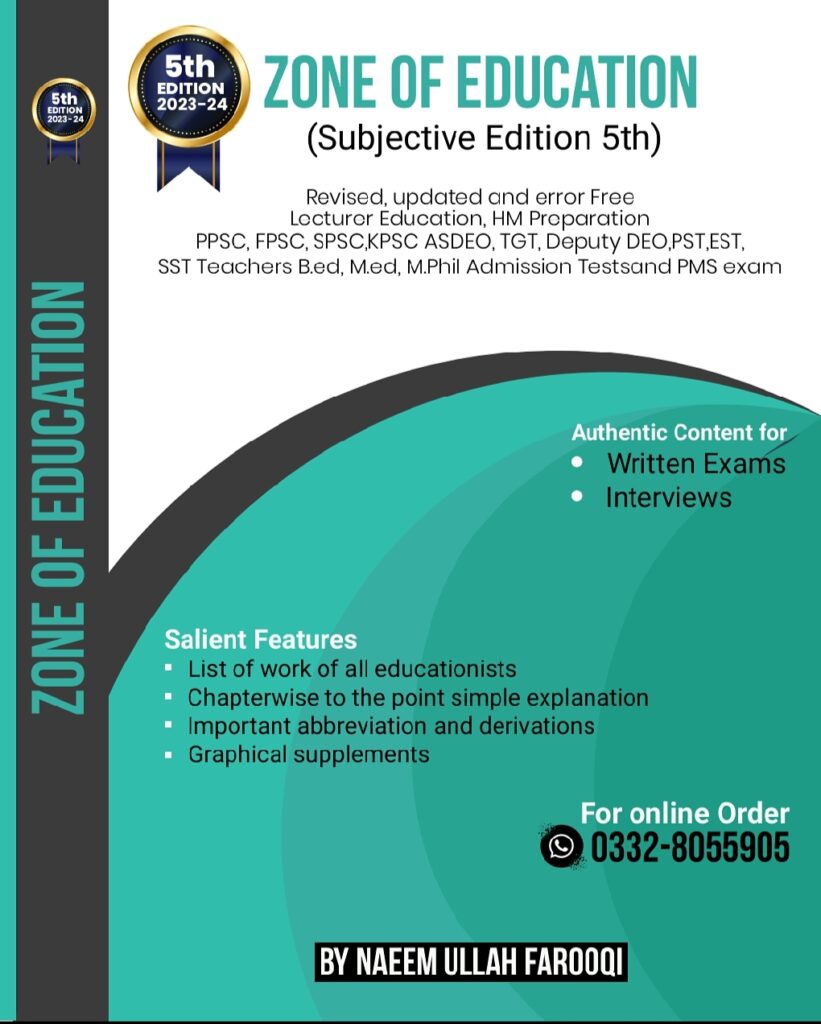History/Perspective 0f Education.
82. In the policy of 1998, it was announced that _____ professors will be sent abroad for Ph.D. every year.
(a) 60
(b) 80
(c) 90
(d) 100
83. According to the policy of 1998, the National Institute of Teacher Education (NITE) will improve the training standard of _____ teachers each year.
(a) 100
(b) 300
(c) 500
(d) 600
84. According to the policy of 1998, the teacher training program is comprised of a _____ system.
(a) Annual
(b) Semester*
(c) Half semester
(d) None
85. The Education Policy 1998 proposed that the Education Service Commission should be established to _____ teachers.
(a) Train
(b) Recruit*
(c) Protect
(d) Polish
86. To make the Educational Policy of 1998-2010, _____ suggestions were received by the education ministry from intellectuals.
(a) 4005
(b) 4025*
(c) 4050
(d) 4000
87. The National Educational Commission 1998 held its session on the 21st of
(a) March
(b) February
(c) May
(d) July
88. The National Literacy Plan was proposed to open _____ to control illiteracy.
(a) Primary schools
(b) Literacy centres
(c) Mosque Projects
(d) Both b & c*
89. Iqra Centre was the project of
(a) National Literacy Plan
(b) Sixth Five Year Plan
(c) Literacy Commission and Mass Education
(d) Provisional Literacy Council
Education System in Pakistan
1. Education conference 1977 was held on:
(a) October 4 ★
(b) October 6
(c) October 2
(d) October 8
2. The admission rate at higher secondary level till 1998 was ______ %.
(a) 11 ★
(b) 13
(c) 15
(d) 16
3. The number of secondary schools till 1998 was:
(a) 11000 ★
(b) 12000
(c) 13000
(d) 10000
4. The number of secondary school teachers was ______ till 1998.
(a) 160500 ★
(b) 160600
(c) 160700
(d) 160800
5. The number of commercial training institutes was ______ till 1998.
(a) 218 ★
(b) 222
(c) 190
(d) 193
6. The number of vocational institutes was ______ till 1998.
(a) 190
(b) 193
(c) 194
(d) 195
7. Till 1998, ______ professors were sent to foreign for Ph.D. every year.
(a) 55
(b) 60
(c) 65
(d) 70
8. Middle school project was launched in:
(a) 1994
(b) 1996
(c) 1997
(d) 1998 ★
9. Under Devolution of Power Plan 2000, ______ is responsible for planning, monitoring, and evaluation of the education system at the district level.
(a) Federal Government
(b) Provincial Government
(c) District Government ★
(d) None
10. In Pakistan, the primary school education stage consists of five classes (I-V) and enrolls children of age:
(a) 4-6 years
(b) 5-9 years ★
(c) 3-5 years
(d) 4-7 years
11. The President of Pakistan is ______ in case of Federal universities.
(a) Administrator
(b) Chancellor ★
(c) Rector
(d) Incharge
12. The Vice-Chancellor shall preside at the ______ of the university in the absence of the Chancellor.
(a) Result
(b) Annual day
(c) Meeting
(d) Convocation
13. Which city of Pakistan is called the “City of Colleges”?
(a) Peshawar
(b) Karachi
(c) Lahore ★
(d) Islamabad
14. Republic Day is celebrated in the national anthem since ______.
(a) May 09, 1957
(b) June 09, 1957 ★
(c) July 09, 1957
(d) August 09, 1957
15. At the time of partition in 1947, there were ______ primary schools in working.
(a) 8413 ★
(b) 9256
(c) 7687
(d) 6567
16. At the time of partition in 1947, there were ______ technical schools in working.
(a) 30
(b) 35
(c) 40 ★
(d) 45
17. In 1997, how many male teachers were working in Pakistan?
(a) 48676 ★
(b) 49080
(c) 51090
(d) 53427
18. Who became Vice-Chancellor of The Punjab University after partition?
(a) Dr. Sultan Bukhari
(b) Dr. Shameem Hanfi
(c) Dr. Umar Hayat Malik ★
(d) Dr. Abdullah Khan
19. Who was the first female vice-chancellor in Pakistan?
(a) Dr. Naghmana Ali
(b) Dr. Kaneez Yousaf ★
(c) Dr. Memmona Bibi
(d) Dr. Attia Rehman
20. Regarding ______ education, article 13 of the constitution was mentioned in the policy of 1972.
(a) Islamic ★
(b) Scientific
(c) Adult
(d) Teacher
21. The middle schooling in Pakistan is comprised of:
(a) Two years duration
(b) Three years duration ★
(c) Four years duration
(d) Five years duration
22. The age group for middle schooling in Pakistan is:
(a) 9-12 years
(b) 8-12 years
(c) 10-12 years ★
(d) 11-15 years
23. High school children stay for ______ in schools.
(a) Two years ★
(b) Three years
(c) Four years
(d) Five years
1. Who conveyed his educational philosophy through famous novel, Emile?
(a) Locke
(b) Rousseau
(c) Pestalozzi
(d) Frobel
Answer: (b) Rousseau
2. Who developed object lesson emphasizing sensory learning?
(a) Locke
(b) Rousseau
(c) Pestalozzi
(d) Frobel
Answer: (c) Pestalozzi
3. Permissive environment of Frobel’s Kindergarten included:
(a) Gifts
(b) Occupations
(c) Songs
(d) All a, b, c
Answer: (d) All a, b, c
4. Educational Philosophy of Frobel emphasized:
(a) Idealism
(b) Nationalism
(c) Child freedom
(d) All a, b, c
Answer: (d) All a, b, c
5. How many levels, Dewey’s curriculum consisted of:
(a) 3
(b) 5
(c) 7
(d) 9
Answer: (a)
6. Who believed that child must be freed from society’s imprisoning institutions:
(a) Locke
(b) Rousseau
(c) Pestalozzi
(d) Frobel
Answer: (b) Rousseau
7. Who developed pragmatic philosophy and applied it to education:
(a) Montessori
(b) Dewey
(c) Frobel
(d) Rousseau
Answer: (b) Dewey
8. Educators who relate schooling to social purposes are often following the idea of:
(a) Montessori
(b) Dewey
(c) Frobel
(d) Rousseau
Answer: (d)
9. How many developmental stages Rousseau identified:
(a) 2
(b) 4
(c) 5
(d) 7
Answer: (c) 5
10. Maria Montessori was awarded the degree of doctor of:
(a) Medicine
(b) Education
(c) Literature
(d) Science
Answer: (a) Medicine
11. How many types of activity and experience Montessori curriculum included:
(a) 2
(b) 3
(c) 4
(d) 5
Answer: (b)
12. Old Athenian education differed from the Spartan mainly in terms of:
(a) Compulsory military training
(b) Inclusion of physical education
(c) Participation in civic activities
(d) Extent of the intellectual element
Answer: (d) Extent of the intellectual element
13. Spartan education had little or nothing in common with early Athenian education except the:
(a) Simplicity of its educational aim
(b) Emphasis upon military training
(c) Stress upon beauty and grace
(d) Neglect of intellectual training
Answer: a
14. Which one of the following does not belong with the group:
(a) Philanthropinum
(b) Didasealeum
(c) Palaestra
(d) Ephebos
Answer: a
15. In early Athenian education the “paidagogos” was a:
(a) Foreigner
(b) Slave
(c) Teacher
(d) Writer
Answer: (b) Slave
16. Which was not taught in the “didasealeum”?
(a) Gymnastic exercises
(b) Music
(c) Reading and writing
(d) Arithmetic
JOIN ZONE OF EDUCATIONPK!
Discover the most comprehensive and reliable pedagogy resources in Pakistan, curated for competitive exam success. Our content covers all competitive exam MCQs, including PPSC, FPSC, AJKPSC, SPSC, and more. Designed to empower learners with top-notch material and insights, trust us for your preparation journey!


